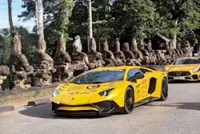You can spot the repurposed gumball machines from a fair distance away, now that they are painted bright yellow and covered in pictures of bees.
The heyday of Germany's gumball machines is long gone, but many buildings still have the bright red boxes mounted on their walls.





